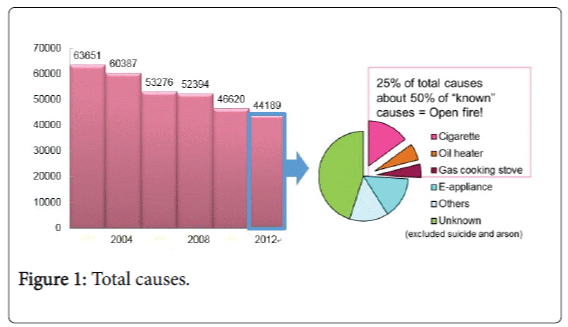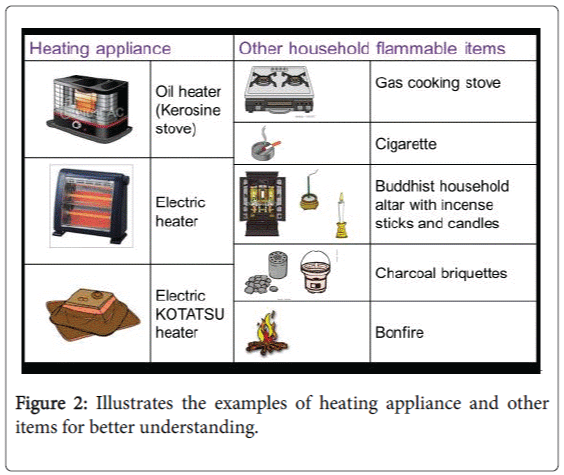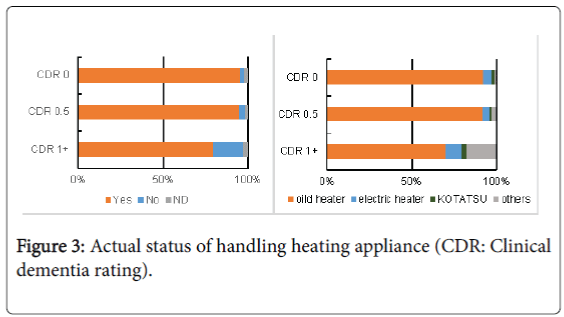Research Article Open Access
Handling of Household Flammables by Elderly Dwelling in the Community: General Survey on Actual Status; The Kurihara Project
Takada J, Meguro K*, Ishikawa H, Ouchi Y, Nakatsuka M and The Kurihara Project Members
Geriatric Behavioral Neurology, Tohoku University, CYRIC, Japan
- *Corresponding Author:
- Kenichi Meguro, MD
Geriatric Behavioral Neurology, Tohoku University
CYRIC, 4-1 Seiryo-machi, Aoba-ku, IDAC, Sendai, 980-8575, Japan
Tel: 81-22-717-7359
Fax: 81-22-717-7339
E-mail: k-meg@umin.ac.jp
Received date: July 18, 2016; Accepted date: August 19, 2016; Published date: August 27, 2016
Citation: Takada J, Meguro K, Ishikawa H, Ouchi Y, Nakatsuka M, et al. (2016) Handling of Household Flammables by Elderly Dwelling in the Community: General Survey on Actual Status; The Kurihara Project. J Community Med Health Educ 6:463. doi: 10.4172/2161-0711.1000463
Copyright: © 2016 Takada J, et al. This is an open-access article distributed under the terms of the Creative Commons Attribution License, which permits unrestricted use, distribution, and reproduction in any medium, provided the original author and source are credited.
Visit for more related articles at Journal of Community Medicine & Health Education
Abstract
Background: Handling errors with household flammables, such as pan burning, may result in serious accidents. However, there have only been a few reports on the actual status of fire accidents, regardless of whether they were small or serious.
Methods: 590 residents aged 75 years or older in Kurihara, northern Japan, consisted of 223 Clinical Dementia Rating (CDR) 0 (healthy), 294 CDR 0.5 (very mild dementia), and 73 CDR 1+ (dementia) participants. The family members living with the subject were asked about the actual status over the past 3 years: Handling of a heating appliance in winter, handling of household flammable items other than a heating appliance in daily life, and accidents and failures related to fire.
Results: We found that 93.1% of the subjects operated heating appliances by themselves. The rate was high in all CDR groups, and that in the CDR 1+group was 79.7%. Furthermore, the use rate of IH (Induction Heating) appliance was quite low. According to the free descriptions, the accidents were caused by a decrease in attention/ executive function and the ability to predict risks.
Conclusion: Their preference of a cooking stove rather than IH was probably due to easier switch system. The risk of rubbish burning has not been well established. Rubbish collection is quite a new service in some regions, and there may be a big gap between the service and their memory of the past habit.
Keywords
Household flammables; Risk management; Mild cognitive impairment; Dementia
Introduction
The “Orange Plan”, a 5 year plan for promotion of measures against dementia in Japan, suggests that people with dementia want to live in their own home as long as possible [1,2]. However, people with dementia or mild cognitive impairment (MCI) face difficulties in maintaining their daily life. Ordinary domestic life requires appropriate management of “fire” and “water,” which are both likely to lead to death when accidents occur.
“Fire” is an extremely high-level and mysterious tool, which only humans can use for living. Although the objectives for the use of fire are related to various living activities, i.e, warming, cooking, and rituals, fire is considered to be sacred because it is dangerous and could cause a “disaster.” “Small fire accidents” caused by forgetfulness in turning a gas cooking stove off and handling errors associated with household flammables may result in pan burning and lead to serious accidents. According to the Fire Defense Agency, one of the most likely causes of small fire accidents at home is the above-mentioned incident with an open fire, i.e, cigarette, oil heater, and gas cooking stove (Figure 1) [3]. To avoid such incidents, while a safer IH (Induction Heating) appliance is recommended, its adoption remains low as the operation is not easy and the adoption rate is approximately 18% [4].
Unfortunately, there are no systematic reports on the actual status of handling errors with household flammables and small or serious fire accidents that involve the community dwelling elderly. We will report two different cases with suspected mild dementia in the community who faced the problems of handling fire, as observed by a chief care manager, a care worker, and a certified social worker (J.T).
Case 1: A 76 Year Old Woman with Suspected Mild Dementia
After her husband passed away, Ms. T moved to Sendai 3 years ago to live with her son. Since he worked during the daytime, she spent most of the day alone while doing most of the housework. Her home physician suggested a diagnosis of diabetes mellitus and “senile dementia.” Although she exhibited memory impairment, she was independent in ADL and Instrumental ADL (IADL). Even after the move to Sendai, she engaged in most of the housework, and she had an established reputation for cooking since she was young. On one occasion, she forgot she was cooking, and the food was burnt and stuck to the pan, with her house filled with smoke. Fortunately there was no problem because her son returned home before a fire broke out. After consultation with her son, her care manager proposed to use an Induction Heating (IH) cooker, with simplified operation procedures, because her son hoped his mother would continue cooking, which has been her major role and motivation in life. However, she could not use the IH cooker, which eventually went to waste.
How could she continue cooking, in which she had been engaged independently to provide meaning for her existence as a woman or mother, while reducing the risks? The manual for the elderly with dementia of Sendai City simply suggests the use of IH cookers in cases of increased risk of fire. At which phase of dementia is it appropriate to begin using an IH cooker? This is the reflection/question of the care manager who initially proposed the use of an IH cooker.
Case 2: A 78 Year Old Woman with Suspected Mild Dementia
Since her husband passed away 7 years ago, Ms. U has been living alone. Her son who lives in an adjacent prefecture, and a younger sister-in-law who lives in the same city each visit her about once a month to confirm her safety. She repeatedly told war stories about nursing care for her husband, and had difficulty in taking medications appropriately. However, good hygiene was maintained in her house. When she visited a home physician for suspected dementia, it was concluded that her conditions were appropriate for her age, and thus no medication was prescribed. She went shopping every day, and used a gas cooker.
She said she was careful, especially with respect to fire, and had no accidents related to fire, i.e, burning and sticking to the pan, which was confirmed in consultation with her son. About 1 year later, she was hospitalized due to appendicitis, which was found late due to lumbar pain that she had experienced for many years. During the hospitalization, she was diagnosed as having a mild degree of Alzheimer disease, and underwent a 3-month treatment course. She was then transferred to a small-scale multifunctional nursing care home. In this case, although dementia was suspected, she was able to live alone while carefully using fire for cooking. Daily cooking is also essential for health. Care managers should manage both the residents’ nutrition for health and cooking environment, with cooperation of other health personnel [5].
As shown in Case 1, for a measure to prevent accidents related to fire among the elderly, i.e, burning of food in a pan, the use of an IH cooker has been recommended in recent years. However, the use of a new apparatus requiring a series of actions for operation would likely be difficult after executive function has decreased. Based on the previous findings [6] suggesting that the ratio of converting to dementia would be high when decreased executive function was confirmed in the elderly with mild cognitive impairment (MCI), it is estimated that the phase of MCI may be too late to learn to use an IH cooker.
As reported in Case 2, how does the use of fire requiring high-level executive function relate to brain function, and how should a caregiver take coping behavior and prepare an environment for the elderly based on prediction of the risks? Based on these perspectives, we investigated the relationship between the actual use of fire and brain function among local elderly residents.
The purpose of this study was to report the results of survey on the actual status related to small or serious fire accidents caused by handling errors with household flammables in Kurihara city.
Materials and Methods
Participants
We had conducted a population-based prevalence study of dementia over 3 years, from 2008 to 2010, in cooperation with Kurihara city of Miyagi Prefecture in northern Japan. The city consists of 255 towns and villages. As of December 2008, the population and aging rate were 78,000 and 31.2%, respectively.
Due to the severe winter with heavy snowing, the residents cannot live without the use of a heating appliance. The concept of this project was explained to 1,254 elderly aged over 75 years who lived in 19 areas selected by public health nurses, and 592 (47.2%) who provided informed consent were included in this study [7]. They underwent MRI, Clinical Dementia Rating (CDR) scale [8,9], neuropsychological tests, and a questionnaire which was administered to their family members. The prevalence of dementia was 12.4% and that the percentage of the subjects with CDR 0.5 was 49.8% when MCI in a broad sense was determined as CDR 0.5 [7].
Ethics
Written informed consent was obtained from all of the participants with CDR 0 and 0.5 and from the family of those with CDR 0.5 and those with dementia. The ethical committee of Kurihara city and Tohoku University Graduate School of Medicine approved the study.
Survey on the actual status
The family members living with the subject were asked about the actual status of the handling of household flammables in daily life over the past 3 years.
• Handling of a heating appliance during winter months and the current status of handling of household flammables
• Handling of household flammable items, other than a heating appliance
• Accidents and failures related to fire in the past 3 years (Figure 2).
Results
As Figure 3 shows, we found that 93.1% (551/592) of the subjects operated heating appliances by themselves. The rate was high in all CDR groups, and that in the CDR 1+group was 79.7% (59/74).
As Figure 4 shows, the rate of handling of household flammable items other than heating appliances was similar in the CDR 0.5 and CDR 0 groups. Furthermore, the use rate of IH appliance was quite low.
According to the descriptions in the survey on the actual status, the accidents were caused by a decrease in attention/ executive function and the ability to predict risks in all CDR groups. For example, “I forgot I was cooking! I was distracted by something and failed to switch off” or “I always burn the rubbish in the garden. I should have imagined the fire would spread to the vinyl house. Nearly burnt down the house.” The association between the accidents with memory and attention/executive function is described in the results and discussion for Part II.
Discussion
The high use rate of flammable appliances for the past 3 years might be because they used cooking stoves and burned rubbish in the garden.
It was considered that the reason for their preference of the use of a cooking stove was that the switch system was easy for them to handle. While IH appliances are recommended for people who find it difficult to handle flammable items, the operation is complicated and not necessarily suitable for elderly.
The elderly may have increased burden in learning how to use a new cooking apparatus (tool) with no direct view of the fire and no sensation of heat, because their semantic memory is different from that for conventional tools. The flat work surface, holding down of a button, and other new operational procedures may be inappropriate for the elderly. It may be desirable to construct a cooking cabinet and work surface that would enable easy understanding of ON and OFF using visual, auditory and tactile feedback. It should be investigated whether the safety, functionality, and ease of use of such a new apparatus would be appropriate for the elderly from the viewpoint of brain function.
The risk of rubbish burning, which is banned in some regions according to the local ordinance, has not been well established. Rapid changes of the times may also influence it. Rubbish collection is quite a new service in some regions, and in Japan there were garbage incinerators even in elementary schools until around 1975. The targeted area in this study was an agricultural village whose environment has not markedly changed compared with the time. The citizens still burn rubbish in their own gardens because there may be a big gap between the above-mentioned new rubbish collection service and their memory of the past habit of rubbish burning in their own gardens, or because there may be a geographical distance between their house and the rubbish collection base. Unlike urban areas, rubbish collection service is not door-to-door in an agricultural village. As the residents in such areas have to drive a car to dispose of their rubbish, it is much easier to burn the rubbish in their gardens.
This survey result showed that induction-heating (IH) appliances were very less likely to be introduced into the subjects’ houses. An electric IH appliance is recommended for people who are at risk of handling errors with household cooking appliances, but IH appliances cannot be used during a power failure, require special pans and pots; and it is difficult to handle for the elderly due to the complicated button operation. In fact, safety and convenience are often mutually contradictory. Even children can use matches, and playing with matches may sometimes cause fire accidents. While an IH appliance is difficult to handle due to its complicated operation, it does reduce the risk of fire accidents. It should be considered that the residents would likely come to not to cook much at home due to the difficulty in handling the IH appliance and soon forget about the existence of the appliance. In brief, an IH appliance that is easy and simple to handle for elderly should be developed.
We found that more than 80% of the subjects operated heating appliances in the past and still operated by themselves. The use rate of IH appliance was quite low. The accidents were caused by a decrease in attention/executive function and the ability to predict risks. Their preference of a cooking stove rather than IH was probably due to easier switch system.
Acknowledgement
We are grateful to the staff at Kurihara city and the staff at the Geriatric Behavioral Neurology, Tohoku University, CYRIC.
References
- http://www.mhlw.go.jp/stf/houdou/2r9852000002j8dhatt/2r9852000002j8ey.pdf
- Ministry of Health, Labour and Welfare (2014) For "- Toward the friendly community development in dementia measures promoting a comprehensive strategy - elderly people with dementia, etc. (new orange plan)".
- The Japan Fire and Disaster Management Agency (2013) Fire fighting white paper.
- The Japan Statistics Bureau, Ministry of Internal Affairs and Communications (2010 National survey on consumption.
- Ciccone MM, Aquilino A, Cortese F,Scicchitano P, Sassara M, et al. (2010) Feasibility and effectiveness of a disease management model in the primary health care system for patients with heart failure and diabetes (Project Leonardo). Vascular Health and Risk Management 6: 297-305.
- Meguro K, Ishii H, Kasuya M,Akanuma K, Meguro M, et al. (2007) Incidence of dementia and associated risk factors in Japan: The Osaki-Tajiri Project. J Neurological Scien 260:175-182.
- Meguro K, Tanaka N, Kasai M, Nakamura K, Ishikawa H, et al. (2012) Prevalence of dementia and dementing diseases in the old-old population in Japan: The Kurihara Project. Psychogeriatrics 12: 226-234.
- Morris JC (1993) The Clinical Dementia Rating (CDR): current version and scoring rules. Neurology 43: 2412-2414.
- Meguro K (2004) A Clinical Approach of Dementia: An Instruction of CDR Worksheet [Japanese]. Tokyo: Igaku-Shoin75-88.
Relevant Topics
- Addiction
- Adolescence
- Children Care
- Communicable Diseases
- Community Occupational Medicine
- Disorders and Treatments
- Education
- Infections
- Mental Health Education
- Mortality Rate
- Nutrition Education
- Occupational Therapy Education
- Population Health
- Prevalence
- Sexual Violence
- Social & Preventive Medicine
- Women's Healthcare
Recommended Journals
Article Tools
Article Usage
- Total views: 11359
- [From(publication date):
August-2016 - Aug 31, 2025] - Breakdown by view type
- HTML page views : 10397
- PDF downloads : 962




